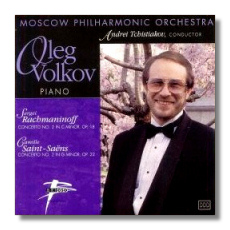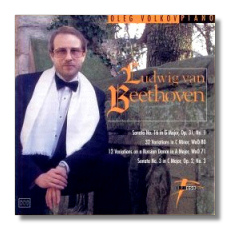
The Internet's Premier Classical Music Source
Related Links
- Latest Reviews
- More Reviews
-
By Composer
-
Collections
DVD & Blu-ray
Books
Concert Reviews
Articles/Interviews
Software
Audio
Search Amazon
Recommended Links
Site News
 CD Review
CD Review
Volkov Plays

- Sergei Rachmaninoff: Piano Concerto #2 in C minor, Op. 18
- Camille Saint-Saëns: Piano Concerto in G minor, Op. 22
Oleg Volkov, piano
Moscow Philharmonic Orchestra/Andréi Tchistiakov
Brioso BR114 DDD 60:00


Ludwig van Beethoven
- Piano Sonata #16 in G Major, Op. 31, #1
- 32 Variations in C minor, WoO 80
- 12 Variations on a Russian Dance in A Major
from Paul Wranitsky's Ballet "Das Waldmächen", WoO 71 - Sonata #3 in C Major, Op. 2, #3
Oleg Volkov, piano
Brioso BR115 DDD 73:58
The Rachmaninoff Second had for decades been the second most popular piano concerto in the world's concert halls, the Tchaikovsky First, of course, being preeminent. In the last ten or fifteen years, this C minor concerto's older sibling, the virtuosic and once-neglected Third, has at least caught up, maybe even surpassed it. The Second is a better-crafted, if less dramatic, work. It may well not feature the blood-and-thunder cadenzas or the extroverted grandiosity found in the Third, but neither does it suffer from the structural and textual problems that plague the later piece. And, like most great concertos, it can inspire several valid interpretive approaches.
Volkov takes a rather ponderous one here. It works well, the pianist deftly pointing up the melancholy, the tenderness, and the radiance of this very Russian concerto. He neither shortchanges the work's virtuosic persona nor plays down its Tin-Pan-Alley appeal. He scrupulously follows the composer's intentions, too, producing in the process a wide dynamic range and rich tone that can be velvety one moment, then powerful yet never fulsome the next. His overall timing of 35:21 is, as is common today, on the slow side. (The Lill/Nimbus recording, to cite just one recent example, is nearly a minute longer, though.) What is most noticeable about Volkov here is his consummate artistry from first note to last. There is not a measure that passes beneath his fingers without thought or without feeling; and, happily, there's not a single instance of an annoying eccentricity or mannerism in his execution. I especially like his second movement, which never drags, as so often happens in lesser hands. In sum, Volkov, one might daringly observe, approaches artistic perfection in this performance.
But, of course, this kind of perfection can have its limitations. There will be many listeners who won't find this Second to their liking, for, while Volkov is always the sensitive artist, he eschews thunder and swagger, traits that can enliven what is, to many, a war horse work that needs some invigoration, some risk-taking, some swashbuckling playing. Personally, I can live quite satisfied with Volkov's recording, though I'd want to keep the Janis/Mercury at hand and my favorite Rachmaninoff Second, the Rubinstein/RCA. Andréi Tchistiakov and his Moscow players abet Volkov splendidly here. In sum, this is one of the finest Rachmaninoff Seconds I've ever heard.
The Saint-Saëns, a rather odd coupling (I would have preferred to hear this pianist's Rach 3 instead), comes off sounding a bit brighter and lighter, as well it should. Volkov brilliantly points up the Lisztian menace (try the octave passage beginning at 5:58 in the first movement), its carefree playfulness (second movement), and its urgent but innocuous busyness (finale). Again, his high artistry permeates the whole performance, for once making me a believer in this concerto. Tchistiakov leads with the same knowing baton, and the Moscow Philharmonic responds with enthusiasm and commitment. Excellent notes and fine sound in both works.
For the Beethoven disc I could almost write the word "ditto" and call it quits. Almost. But Volkov's artistry draws out a slightly different result in the G Major Sonata. The first movement is played in a somewhat relaxed and probing manner, where perhaps a bit more tension might heighten the musical yield. Brendel (Philips), for example, imparts more animation and urgency, and is preferable here. In the ensuing movements, however, Volkov's less driven way works quite well, delightfully revealing the Adagio as graceful, even playful, and the Rondo as a substantive, subtle conclusion to a great work. On the whole, the performance is certainly worthwhile for its clarity and many insights.
The C Major Sonata fares even better. Volkov offers his usual clarity, but also imparts appropriate animation and color. The first movement is rendered with as much brio and interpretive acumen as you're likely to hear on any recording. Not that the ensuing movements are lesser achievements: the Adagio is gripping in the pianist's deft handling of the alternation of the ethereal with the grim; and Volkov effectively points up the vivacity and muscle in the Scherzo, and the joy in the Finale. A splendid performance!
The two remaining works, 32 Variations in C minor and the Russian Dance Variations are also superbly played, and round out an extremely interesting program. The sound reproduction is excellent, and the notes informative. Of Volkov's six albums on the Brioso label, which feature the varied likes of Schubert, Prokofieff, Schnittke, Scriabin, Liszt, Schumann and others, I haven't heard one on which his playing is less than masterful and imaginative. He is a major artist well worth attention.
Copyright © 1998, Robert Cummings


















